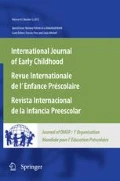Summary
Some perspectives on society, family and childhood leave us with the impression that contemporary children are growing up in a post-traditional society that has decisively broken away from previous values. Based on a representative study of specific maternal childrearing values in a Scandinavian welfare society (Denmark) this article will present results that challenge this proposition. The actual degree of change and continuity is discussed, highlighting some important relationships between maternal vocational/educational background, childrearing beliefs, sanctions and the child’s temperamental style.
Résumé
L’étude de société, de la famille et de l’enfance donnent l’impression que les enfants d’aujourd’hui grandissent dans une société post-traditionnelle qui a rompue de façon décisive avec les valeurs préexistantes. Fondé sur une étude représentative des valeurs maternelles d’éveil spécifiques à l’état providence dans la société scandinave (Danemark), cet article présente des résultats relatifs à cette analyse. Le réel degré de changement, comme de continuité est examiné, soulignant l’importance des relations entre le contexte maternel éducatif et professionnel, les dogmes liés à l’éveil, les sanctions et le caractère de l’enfant.
Resumen
Algunas perspectivas de la sociedad, la familia y la niñez, nos dan la impresión de que los niños de hoy crecen en una sociedad post-tradicional que se ha separado definitivamente de los valores de las sociedades previas. Sobre la base de una investigación representativa de los valores maternales especificos de una sociedad escandinava tradicional (Dinamarca), éste artículo presenta los resultados que discuten esta proposición valòrica. Se critica el nivel acutal de cambio y de continuación, subrayando algunas relaciones importantes entre la formación profesional de la madre, convencimientos de cómo educar al niño, sanciones y el tipo de temperamento del niño.
Similar content being viewed by others
References
Andersen, B. J. & Hansen, E. J. (2000).Et Sociologisk Vœrktøj — Introduktion til den Kvantitative Metode. København: Hans Reitzels Forlag.
Andersen, E. B. (1973).Conditional Inference Models for Measuring. København: Mentalhygiejnisk Forlag.
Andersen, D. & Hestbæk, A-D. (1999).Ansvar og Vœrdier. En Undersøgelse i Børnefamilier. København: Socialforskningsinstituttet.
Brenner, V. & Fox, R. A. (1999). ‘An Empirically Derived Classification of Parenting Practices’.The Journal of Genetic Psychology,160(3).
Beck, U. (1997).Risikosamfundet—På Vej mod en Ny Modernitet. København: Hans Reitzels Forlag.
Berk, L. (2000).Child Development. 5th edition. Boston: Allyn and Bacon.
Bourdieu, P. (1997).Af Praktiske Grunde—Omkring Teorien om Menneskelig Handlen. København: Hans Reitzels Forlag.
Bourdieu, P. & Wacquant, L. J. D. (1992).Refleksiv Sociologi—Mål og Midler. København: Hans Reitzels Forlag.
Bruner, J. (1990),Acts of Meaning. Massachusetts: Harvard University Press.
Bruner, J. (1998).Uddannelseskulturen. København: Munksgaards Forlag.
Christensen, E. (2000).Det 3-årige Barn. København: Socialforskningsinstituttet.
Christensen, E. (2001). ‘Brug af Legemlig Afstraffelse i Opdragelsen af 3-årige’.Nordisk Psykologi,53(1).
Christoffersen, M. (1999).Spœdbarnsfamilien. København: Socialforsknings-instituttet.
Cole, M. (1996).Cultural Psychology. Cambridge, Massachusetts: Harvard University Press.
Dencik, L. (1995). ‘Välfärdens Barn eller Barns Välfärd? Om Till-syn, Hän-syn, och Fel-syn’. In L. Dahlgren & K. Hultqvist (Eds.),Seendet och Seendets Villkor. Stockholm: HLS Förlag.
Dencik, L. & Jorgensen, P. S. (Eds.) (1999).Børn og Familie i Det Postmoderne Samfund. København: Hans Reitzels Forlag.
Dogde, K. A., et al. (1994). ‘Socialization Mediators of the Relation between Socioeconomic Status and Child Conduct Problems’.Child Development, 65.
Goodenow, J.J. & Collins, W. A. (Eds.) (1990).Development According to Parents: The Nature, Sources, and Consequences of Parent’s ideas. Hillsdale, N.J.: Erlbaum Publishers.
Halldén, G. (1999). ‘Forældreperspektiv og Barneperspektiv på Familieliv og den Gode Barndom’. In L. Dencik & P. S. Jørgensen (Eds.),Børn og Familie i Det Postmoderne Samfund. København: Hans Reitzels Forlag.
Hansen, E. J. (1995).En Generation Blev Voksen. København: Socialforsknings-instituttet.
Inglehart, R. et al. (1998).Human Values and Beliefs: A Cross-Cultural Sourcebook: The University of Michigan Press.
Jeppesen, K. J. & Nielsen, A. (1998).Etniske Minoritetsbørn i Danmark — Det Første Leveår. København: Socialforskningsinstituttet.
Jørgensen, C. R. (2002).Psykologien i Senmoderniteten. København: Hans Reitzels Forlag.
Kompetencerådet (1998). Rapport. København: Strategisk Forum.
Kuczynski, L. et al. (2001). ‘Value Socialization in a Bi-directional Context’. In J.E. Grusec & L. Kuczynski (Eds,),Parenting and The Internalization of Values: A Handbook of Contemporary Theory. New York: Wiley & Sons.
Larsen, J. E., Lind, J. & Møller, I. H. (2000).Kontinuitet og Forandring. Gylling: Samfundslitteratur.
Langsted, O. & Sommer, D. (1994).Småbørns Livsvilkår i Danmark. København: Hans Reitzels Forlag
Luster, T., et al. (1989). ‘The Relation Between Parental Values and Parenting Behavior’.Journal of Marriage and the Family, 51.
Monrad (1936).Moderens Dagbog — Det Sunde Barns Pleje. København: Gyldendalske Boghandel — Nordisk Forlag.
Palacious, J. (1990). ‘Parent’s Ideas About The Development and Education of Their Children. Answers to Some Questions’.International Journal of Developmental Psychology,13(2).
Rasch, G. (1980).Probabilistic Models for Some Intelligence and Attainment Tests. USA: Chicago: University of Chicago Press.
Rogoff, B. (1990).Apprenticeship in Thinking. Oxford: Oxford University Press.
Schaffer, R. (1996).Social Development. Oxford: Basil Blackwell Publishers.
Sommer, D. (2003a).Barndomspsykologi — Udvikling i en Forandret Verden. 2nd rev. ed. København: Hans Reitzels Forlag.
Sommer, D. (2003b).Barndomspsykologiske facetter. Aarhus: Systime Academic.
Sommer, D. (1999). ‘Faderskab i Radikalmoderniteten — En Undersøgelse af Fader-Spaedbam Relationen’. In P.S. Jørgensen & L. Dencik (Eds.),Børn og Familier i Det Postmoderne Samfund. København: Hans Reitzels Forlag.
Sommer, D. (2001).At Blive en Person — Forœldreskab og Borns Tidlige Folelser. København: Hans Reitzels Forlag.
Author information
Authors and Affiliations
Corresponding author
Rights and permissions
About this article
Cite this article
Sommer, D. Values at stake in late modernity relationships between maternal educational background, childrearing views, sanctions and children’s temperament. IJEC 37, 95–116 (2005). https://doi.org/10.1007/BF03165834
Issue Date:
DOI: https://doi.org/10.1007/BF03165834




